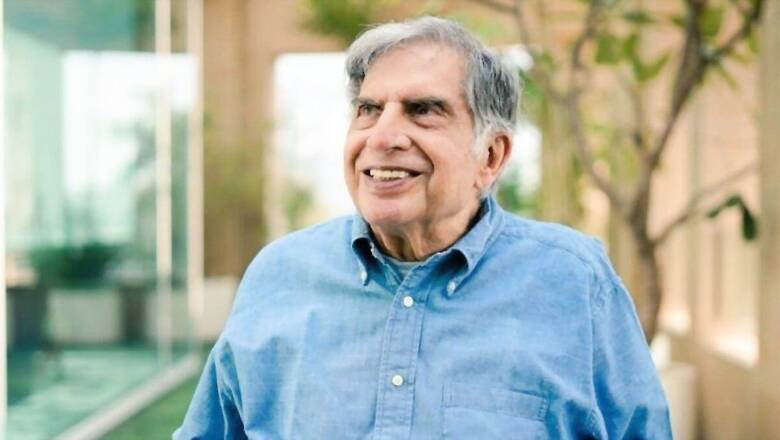
views
Veteran industrialist and Tata Sons Chairman Emeritus Ratan Tata died at the age of 86 late on Wednesday. He was admitted to Mumbai’s Breach Candy Hospital since Monday due to a sudden drop in blood pressure and was in critical condition in the intensive care unit.
The Tata family made the announcement of Ratan Tata’s death on Tata Group’s X handle. “We, his brothers, sisters and family, take solace and comfort in the outpouring of love and respect from all who admired him. While he is no longer with us in person, his legacy of humility, generosity, and purpose will continue to inspire future generations,” the statement read.
pic.twitter.com/kV2c4jXaDK— Tata Group (@TataCompanies) October 9, 2024
In his official statement, Tata Sons chairman N Chandrasekaran said Ratan Tata was a “truly uncommon leader whose immeasurable contributions have shaped not only the Tata Group but also the very fabric of our nation”. He said Tata was more than a chairperson for the Tata Group, and was a “mentor, guide and friend” to him.
“He inspired by example. With an unwavering commitment to excellence, integrity, and innovation, the Tata Group under his stewardship expanded its global footprint while always remaining true to its moral compass,” he said, mentioning Tata’s dedication to philanthropy and the development of society — be it in education or healthcare — that left a “deep-rooted mark” and “will benefit generations to come”.
“On behalf of the entire Tata family, I extend our deepest condolences to his loved ones. His legacy will continue to inspire us as we strive to uphold the principles he so passionately championed,” he added.
A visionary and prominent philanthropist, Ratan Tata led the Tata Group from March 1991 to December 2012 as chairman of Tata Sons, which is the holding company of the salt-to-steel conglomerate. He took the Tata Group to new heights and, thanks to him, it is now worth more than $365 billion (Rs 30.7 lakh crore approx) as on March 31, 2024.
According to the Tata Group website, in 2023-24, the Tata companies, or enterprises, together generated a revenue of over $165 billion (Rs 13.9 lakh crore approx). These 30 companies, which collectively employ over 10 lakh people, include Tata Steel, Tata Consultancy Services (TCS), Tata Motors, Indian Hotels, Air India, Jaguar Land Rover, Titan, Infiniti Retail (Croma), Trent (Westside, Zudio, Zara) among others.
The man who launched the Tata Nano in 2009 – touted as the “People’s Car” – was conferred with the Padma Bhushan in 2000 and the Padma Vibhushan in 2008. The loss of one of India’s pioneers across industrial sectors, from steel to civil aviation and hospitality to consumer products, will be deeply felt.
Tata’s death was condoled by President Droupadi Murmu, who said India has lost an icon “who blended corporate growth with nation building, and excellence with ethics” while Prime Minister Narendra Modi called him “a visionary business soul and an extraordinary human being”. Several big industrialists, including Mukesh Ambani, Gautam Adani, Harsh Goenka and Anand Mahindra, also paid their respects.
‘Thank you for thinking of me’
Even in his last social media interaction on Monday (October 7), Ratan Tata played the ever-gracious and humble business tycoon. He urged people to refrain from speculating over his hospitalisation and said there is no cause for concern regarding his health as he is undergoing check-ups for age-related medical conditions.
While posting the statement over his health concerns, he said: “Thank you for thinking of me.” “These claims are unfounded… I am currently undergoing medical check-ups due to my age-related medical conditions,” he said via his statement.
Requesting the public and media to refrain from “spreading misinformation”, he said: “There is no cause for concern. I remain in good spirits. I am aware of recent rumours circulating regarding my health and I want to assure everyone that these claims are unfounded.”
Aggressive Expansion Under Ratan Tata
Ratan Tata took over as the chairman of Tata Sons in March 1991 and retired on December 28, 2012. Upon assuming leadership, he aggressively sought to expand it and, as a result, over half of the Tata Group’s revenues were derived from outside the country.
During his tenure, the Tata Group’s revenues grew manifold, totalling USD 100.09 billion in 2011-12 from a turnover of a mere Rs 10,000 crore in 1991. He led the group into some notable acquisitions, starting from Tetley by Tata Tea for USD 450 million in 2000, to steelmaker Corus by Tata Steel in 2007 for GBP 6.2 billion and the landmark Jaguar Land Rover in 2008 for USD 2.3 billion by Tata Motors.
After retirement, however, Tata faced a boardroom battle with his successor Cyrus Mistry, who was sacked as chairman of Tata Sons on October 24, 2016. He returned as interim chairman of the group after Mistry was removed and handed over the baton to N Chandrasekaran in January 2017 and moved to his role of chairman emeritus of Tata Sons.
The Philanthropist In Ratan Tata
The Tata Group website states that “66 percent of the equity share capital of Tata Sons is held by philanthropic trusts, which support education, health, livelihood generation and art and culture”. Known as one of the foremost philanthropists of the world, who lived a relatively modest lifestyle, Ratan Tata continued to head the charitable trusts even after his retirement.
His family has long been involved in philanthropic causes, a legacy which he carried forward. The Tatas have earned accolades like the Carnegie Medal of Philanthropy in 2007. The Tata Group has also established premier institutions such as the Indian Institute of Science (IISc), the Tata Institute of Social Sciences (TISS), and Tata Memorial Hospital, which is a cancer care centre.
Adopted by his grandparents at the tender age of 10 after his parents’ divorce, he graduated from the Cornell University College of Architecture with a bachelor’s degree in architecture. He first joined the business in 1961, where he worked on the shop floor of Tata Steel.
Noel Tata, the son born from their father Naval Tata’s second marriage, is a strong contender for inheriting the Tata legacy. Noel’s three children – Maya, Neville and Leah – are seen as potential successors to the family legacy.
















Comments
0 comment